Historic relationship between Palestine and Northern Ireland
While there is support for Palestine and the Palestinian people throughout the island of Ireland, the political and cultural support is arguably strongest among republicans in Northern Ireland. Both Palestinian nationalism and Irish republicanism have strong roots in the anti-Colonial movement, particularly in the last 50 years.
Irish, Palestinian, South African and Basque groups have regularly expressed solidarity for their respective independence causes.
Palestinian flags and murals in support of the Palestinian people can be seen in republican neighbourhoods in Northern Ireland. There are also a number of Irish based support groups, who regularly organise protests and marches in support of Palestinian support groups. Many of those taking part in protests can often be seen wearing the keffiyeh, a traditional headdress. A number of people from Northern Ireland have been detained and questioned by Israeli defence forces while visiting Palestine.
In 2010 Northern Ireland born Nobel Peace Prize winner Mairead Maguire was deported from Israel and banned from the region for 10 years for attempting to break a naval blockade of Gaza.
In 2016 Ms Maguire was again detained and deported by Israeli defence forces after trying to again break the naval blockade with other peace activists.
There is also support for Israel from some elements within the Protestant/unionist/loyalist community. Israeli flags can be seen flying from lamp posts in some loyalist communities. This support may be partly inspired for religious reasons but also because some members of the unionist community view Israel and Northern Ireland as both suffering from the effects of terrorism from pro-independence groups.
Read more:
- Why republicans and loyalists support different sides in the Israeli/Palestinian conflict
- Murals in Northern Ireland: An explainer
- ‘She was my life. I don’t know how to face my children now’ - Belfast-born Palestinian makes appeal after wife is killed in Gaza
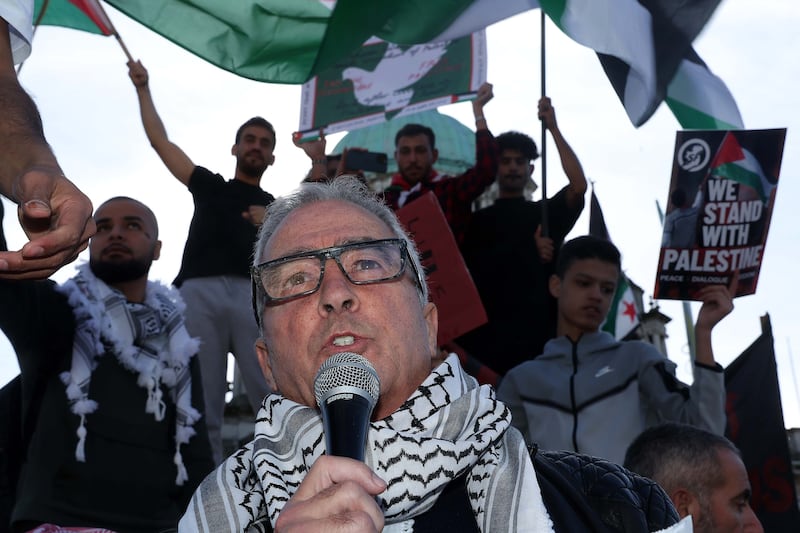
The Irish Palestine Solidarity Campaign (IPSC)
The Irish Palestine Solidarity Campaign (IPSC) is an Ireland-wide group and it has been holding rallies around the island of Ireland since the start of the Israeli-Hamas war.
A series of rallies were held on October 21 calling for an end to Israel's bombing and blockade of Gaza. Politicians, including Sinn Fein Vice-President Michelle O'Neill and SDLP leader Colum Eastwood joined rallies in Dungannon, Co Tyrone, and Derry city, respectively. Similar gatherings were held in Dublin and Cork.
Ireland and Palestine relations
The Irish government’s stance on the Palestine/Israel conflict has traditionally supported a two-state solution in the Middle East, with Israel and a future Palestinian state living side by side in peace.
Ireland has frequently supported United Nations resolutions condemning Israeli actions, especially those concerning Gaza.
Various Irish government delegations have visited the region over the years to engage with both Israeli and Palestinian authorities.
In 2021 the Irish parliament became the first EU state to unanimously condemn Israel’s “de facto annexation’ of Palestinian land in the occupied territories.
In recognition of the move, the Palestinian Authority flew the Irish flag above the city hall in Ramallah.
Read more:
- Chris Donnelly: Peace can never be built on oppression and injustice
- Tom Collins: It’s always innocents who pay price of war
- Patrick Murphy: Israel’s role in creation of Hamas demonstrates how today’s problems begin with yesterday’s decisions
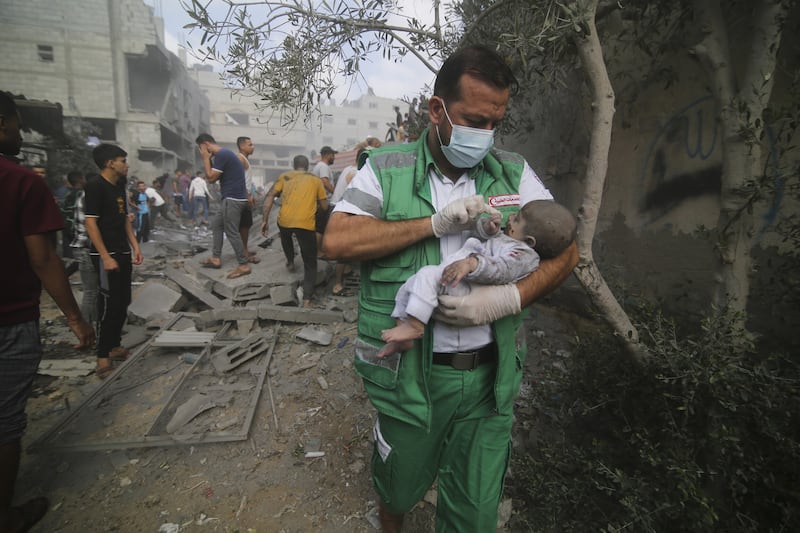
Does Ireland recognise Palestine?
Yes, in 1980, Ireland was the first Western country to recognize the Palestinian Liberation Organization (PLO) as the “sole legitimate representative of the Palestinian people”.
It has also expressed concerns over the living conditions of civilians in Gaza, who have been affected by decades of Israeli blockades.
The Irish government has repeatedly called for unhindered access for humanitarian aid for Gaza.
It backed the 2012 United Nations General Assembly resolution granting non-member observer state status to Palestine.
In 2021 it condemned the eruption of violence between Israel and Hamas in Gaza which led to the deaths of thousands of civilians and called for a ceasefire and a return to peaceful negotiations.
In 1993 former Palestine Liberation Organisation (PLO) leader Yasser Arafat, who went on to become the first president of the Palestinian Authority, visited Ireland where he met Irish political leaders.
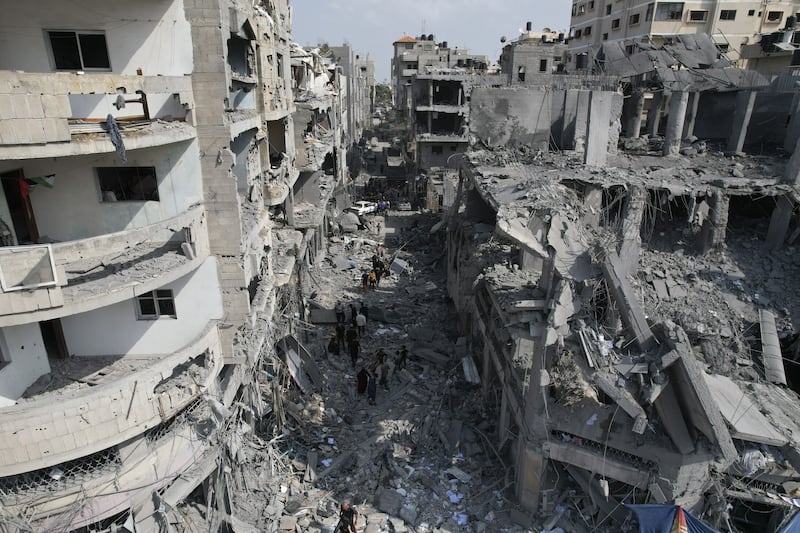
This visit was significant, as it took place around the time of the Oslo Peace Accords, which were aimed at achieving peace and a two-state solution in the Middle East.
In 1999 then Taoiseach Bertie Ahern visited Gaza where he met President Arafat and visited the Jabaliya refugee camp.
In 2016 President of Ireland Michael D Higgins visited the West Bank, meeting Palestinian leaders and expressing support for a two-state solution.
In 2018 the Dail passed the Occupied Territories Bill, which would have banned all goods and services originating in illegal settlements in the West Bank.
In the same year Tanaiste Simon Coveney visited Israel and Palestine, where he discussed the peace process and the humanitarian situation in Gaza.
In 2020 President Higgins had planned another visit to Israel and Palestine, however, the trip was postponed due to the Covid-19 pandemic.
In October 2023 President Higgins criticised comments made by European Commission leader Ursula von der Leyen during a trip to Israel.
The EU Commission leader visited Tel Aviv days after Hamas militants had killed hundreds of Israeli citizens and took 200 civilians hostage during a no warning attack on Israel.
Condemning the Hamas killings, Ms von der Leyen said: “In the face of this unspeakable tragedy, there’s only one possible response: Europe stands with Israel. And Israel has the right to defend itself, in fact, it has the duty to defend its people.”
However, the EU Commission leader had failed to publicly endorse the European Union’s official position which - following Israel’s warning that one million citizens in northern Gaza had 24 hours to flee their homes before it would begin bombing the region - called on Israel to respect international law by not attacking innocent civilians.
In a public rebuke, the president of Ireland said that Ms von der Leyen was “not speaking for Ireland and she wasn’t speaking for the opinions that they hold”.
President Higgins said that Israel’s threat of an aerial bombardment on Gaza was a clear breach of international law stating that it was “one thing” to breach international law: “but to actually announce in advance that you’re going to break international law, and that you announce it again and again, and that you do so on an innocent population” was something which reduces international law to “tatters”.
Taoiseach Leo Varadkar later claimed Ms von der Leyen’s comments “lack balance”.
On October 18 2023, Tánaiste Michael Martin announced an additional E13 million funding package for humanitarian assistance for Palestine.
Read more: Israeli ambassador's comments accusing President Higgins of misinformation 'were not helpful'
What is the Irish government’s position on Hamas?
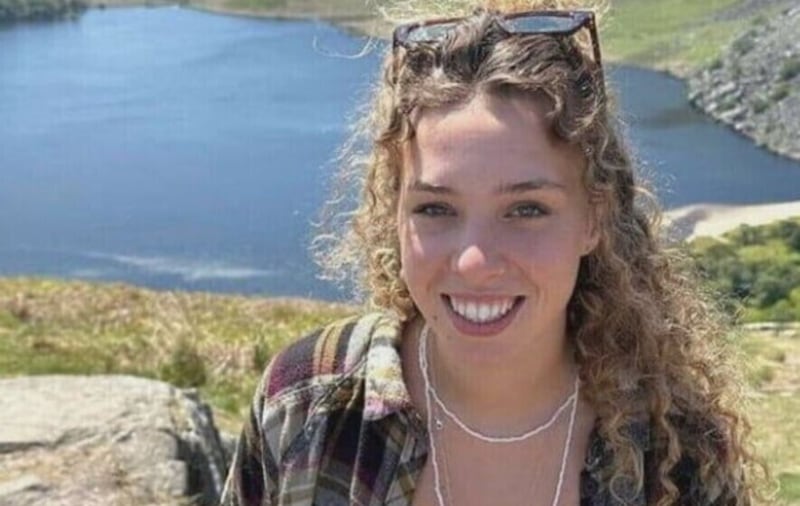
The Dublin government strongly condemned Hamas’s no-warning attack on Israel in October 2023 and said that as a member state of the European Union it endorsed the decision to regard Hamas as a terrorist organisation.
What is the Irish government’s position on the Palestine/Israel conflict?
The Irish government’s stance on the Palestine/Israel conflict has traditionally favoured an agreed two-state solution in the region.
Historically during the late 19th and early 20th centuries Irish republicans had supported Zionists in the Middle East, who while under British rule, had fought for a Jewish state in the region.
However, Irish support for the creation of a Jewish state was severely undermined in 1937 when Zionists accepted British proposals to partition Palestine.
In 1947 then Taoiseach Eamon De Valera opposed the planned partition of Palestine at the League of Nations conference.
Ireland abstained from supporting UN General Assembly Resolution 181, which divided Palestine and created the state of Israel.
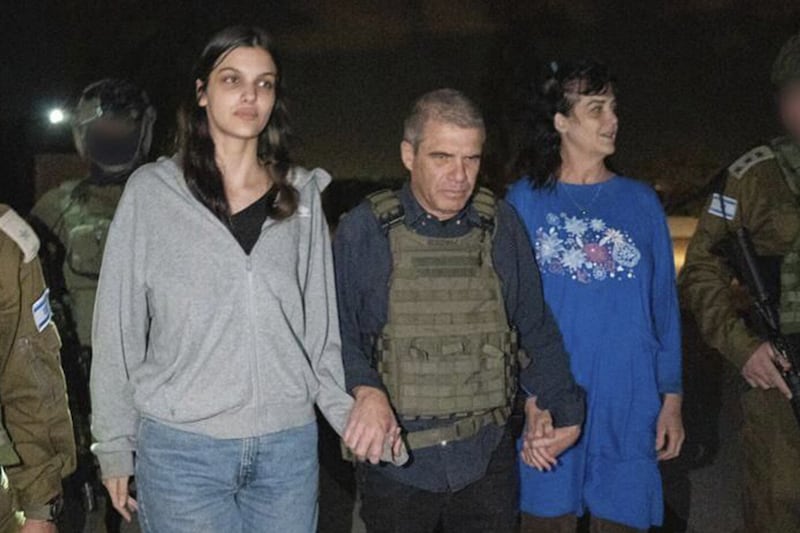
What is the Irish government’s current position on Israel?
Historically, various Dublin government’s have supported a two-state solution in the Middle East, with Israel and a future Palestinian state living side by side in peace. The Irish government has been critical of illegal Israeli settlements in the West Bank and has publicly supported calls for the recognition of East Jerusalem as the capital of any future Palestinian state.
Successive Irish governments, led by both Fianna Fail and Fine Gael parties, have supported the Boycott, Divestment, and Sanctions (BDS) movement, which seeks to exert economic and political pressure on Israel to end discrimination and oppression against Palestinian civilians.
The Dublin government has also been critical of Israeli military and Hamas actions in Gaza and has called for an end to all violence and a peaceful resolution to the conflict.
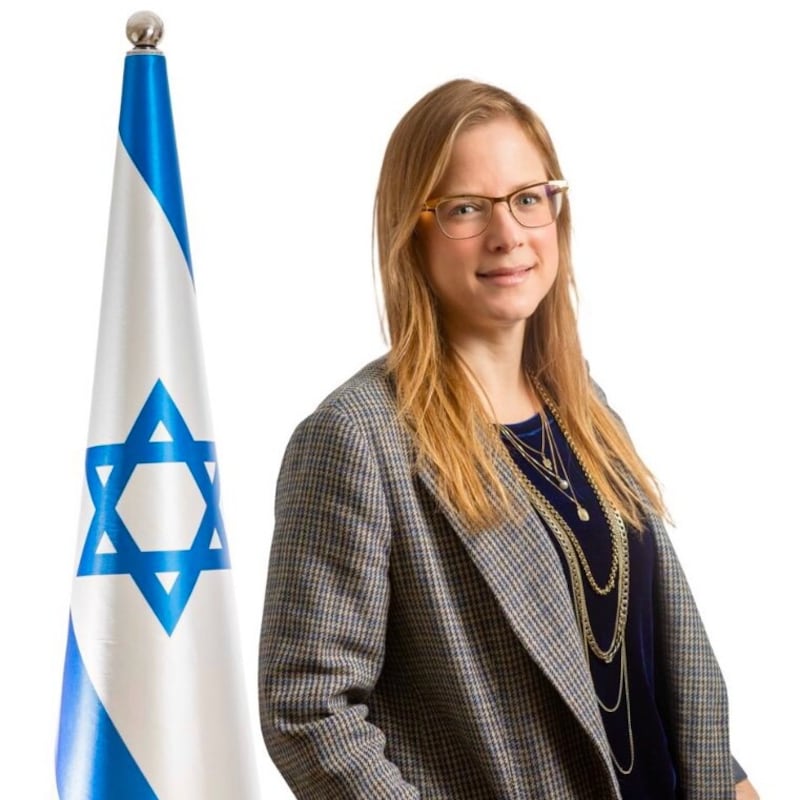
Does the UK government acknowledge Palestine?
The British government has traditionally supported a two-state solution between Palestine and Israel. However, during a visit to Jerusalem on October 19 2023, UK Prime Minister Rishi Sunak vowed to support Israel in its war with Hamas.
“We will stand with you in solidarity,” he told Israel Prime Minister Benjamin Netanyahu, “we will stand with your people. And we also want you to win.”








